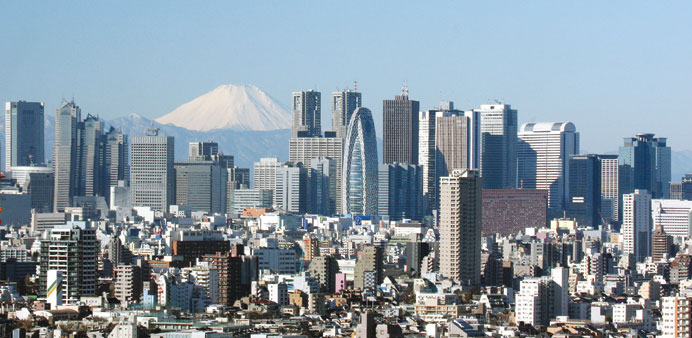A general view of Japan’s financial centre in Tokyo. Japan’s economic outlook has dimmed further and inflation is stalling but analysts in a Reuters poll were split on whether the central bank would ease policy this year or wait until 2015 to revive growth.
Reuters
Tokyo
Japan’s economic outlook has dimmed further and inflation is stalling but analysts in a Reuters poll were split on whether the central bank would ease policy this year or wait until 2015 to try and revive growth.
While a gradual recovery looks likely, an April sales-tax increase which pushed the economy in the second quarter into its deepest fall since the 2011 earthquake and tsunami had economists downgrading growth forecasts amid an anaemic rise in wages and lacklustre exports.
All the analysts in the monthly Reuters survey, taken in the past week, said the Bank of Japan would fail to hit its 2% inflation target before April and most said the BoJ would therefore ease further –although they were unsure on the timing.
Half the economists said the central bank would add to its massive stimulus measures this year while the other half said it would wait until January at least.
“The economy lacks a driving force,” said Takumi Tsunoda, senior economist at Shinkin Central Bank Research Institute. “Still the economy will rebound in July-September after a sharp drop in the second quarter.”
The Reuters survey forecasts a 3.8% bounce this quarter, slowing to 2.1% growth in October-December. Last month’s forecast was for 2.4% July-September growth and 1.9% in the fourth quarter.
In the 12 months to March the economy will grow 0.4%, according to the poll’s median forecast, less than the 0.7% projected last month. Growth will then accelerate to 1.2% next fiscal year, a tad lower than July’s forecast.
The world’s third-largest economy shrank at an annualised 6.8% rate in the second quarter from the previous three months, more than erasing the 6.1% first-quarter surge in the run-up to the tax hike.
Private-sector economists are more pessimistic than the BoJ, which last month cut its growth forecast for this fiscal year to 1.0%. The BoJ expects growth to pick up to 1.5% the following year.
Private consumption, which makes up about 60% of the economy, will likely rebound only 1.5% this quarter, the economists predicted, after it fell 5.0% in April-June,
The BoJ is likely to maintain its rosy inflation projections for this fiscal year in an October report, sources told Reuters on Tuesday, suggesting the bank will not ease policy further for at least the rest of this year.
Analysts remain convinced that inflation is stuck well below the BoJ’s 2% target, with a median forecast of 1.2% this fiscal year and next, up from 1.1% last month.
BoJ Governor Haruhiko Kuroda last week pledged to pursue the bank’s aggressive monetary easing to fully vanquish deflation and said it is necessary to create inflation expectations to get firms to raise wages.
After April’s rise in the sales tax to 8% from 5%, Prime Minister Shinzo Abe is to decide around the end of the year whether to proceed with a further hike, to 10%, in October 2015. The government is trying to curb Japan’s runaway public debt, which is the largest in the industrial world at well over twice GDP.
Eighteen of 22 analysts in the Reuters survey said Abe should raise the tax. This is in stark contrast to the general public: a Nikkei newspaper survey on Monday found 63% opposed the hike, more than double those who favoured it.
“The government should keep the debt in mind,” said Stefan Grosse, economist at Nord LB. “They will keep stimulating the economy, which is costly. Ten% value-added tax is internationally still low and would contribute to a better sustainability of the budget.”

